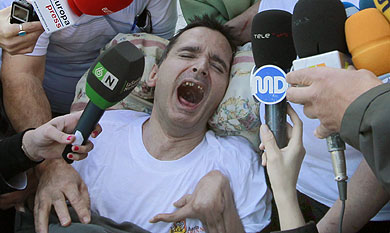A military court of the Kingdom of Bahrain, in a state of emergency from March 15 to confront the massive social protests demanding democratic reforms, has condemned this morning to four Shiite demonstrators to death and three others to life in prison accused of the premeditated murder of two police officers who took part in the repression of the protests, reported the Bahraini state agency.
Lawyers for the defendants, among others arrested hundreds of dissidents during the police campaign launched in March, has denied the charges, but ultimately the responsibility of the court followed the recommendation of the Prosecutor, who demanded the maximum penalty. Those sentenced to death are Ali Hassan Al-Sankis Abdulla Saeed Saeed Abduljalil, ABDULRIDHA Abdulaziz Qassim Hassan Ibrahim Hussain and Ahmed Matar, while the three men sentenced to prison for life are Isa Abdullah Kadhim Ali, Sadiq Ali Mahdi and Hussein Jaafar Abdulkarim.
In the course of all the protests, where an estimated 26 civilians were killed and hundreds were injured as a result of using live ammunition to suppress them, killed four policemen overwhelmed by private cars, according to the regime of Bahrain. No officer has been arrested in connection with the killing of demonstrators.
Bahraini Youth Society for Human Rights, one of the most active of the kingdom with a Shiite majority, ruled for two centuries by a Sunni dynasty, has expressed outrage at the sentence and the process itself. "We reject the trial because the special courts violate international standards and we ask the international community and organizations to respond urgently to stop the trials against demonstrators." The extreme harshness of the sentence reflects the severity of repression in the country, where even the doctors said they were detained and beaten for attending to injured protesters.
Dozens of journalists have lost their jobs for their coverage of events. Bahrain recovered and the death penalty, a punishment not used since 2007, as a final deterrent to restrain any hint of dissent on the island. Before that, remember to Reuters, only one person had been sentenced to death in the three preceding decades.
The fact repudiated resume practice at the international level will only exacerbate the tension between Shiites and Sunnis, at a more than delicate for the region. The military intervention of the Gulf Cooperation Council, consisting of six Sunni countries in the small Bahraini territory to strengthen the dynasty at the expense of the protests of a majority Shiite population, has led to the rejection of nations like Iraq and Shiite Iran.
In the latter case, Tehran has called its ambassador in Cuba, and in return Bahrain recently expelled a Persian diplomat. In addition, activists denounce the destruction of a Shiite religious centers thirty in recent weeks. 


Lawyers for the defendants, among others arrested hundreds of dissidents during the police campaign launched in March, has denied the charges, but ultimately the responsibility of the court followed the recommendation of the Prosecutor, who demanded the maximum penalty. Those sentenced to death are Ali Hassan Al-Sankis Abdulla Saeed Saeed Abduljalil, ABDULRIDHA Abdulaziz Qassim Hassan Ibrahim Hussain and Ahmed Matar, while the three men sentenced to prison for life are Isa Abdullah Kadhim Ali, Sadiq Ali Mahdi and Hussein Jaafar Abdulkarim.
In the course of all the protests, where an estimated 26 civilians were killed and hundreds were injured as a result of using live ammunition to suppress them, killed four policemen overwhelmed by private cars, according to the regime of Bahrain. No officer has been arrested in connection with the killing of demonstrators.
Bahraini Youth Society for Human Rights, one of the most active of the kingdom with a Shiite majority, ruled for two centuries by a Sunni dynasty, has expressed outrage at the sentence and the process itself. "We reject the trial because the special courts violate international standards and we ask the international community and organizations to respond urgently to stop the trials against demonstrators." The extreme harshness of the sentence reflects the severity of repression in the country, where even the doctors said they were detained and beaten for attending to injured protesters.
Dozens of journalists have lost their jobs for their coverage of events. Bahrain recovered and the death penalty, a punishment not used since 2007, as a final deterrent to restrain any hint of dissent on the island. Before that, remember to Reuters, only one person had been sentenced to death in the three preceding decades.
The fact repudiated resume practice at the international level will only exacerbate the tension between Shiites and Sunnis, at a more than delicate for the region. The military intervention of the Gulf Cooperation Council, consisting of six Sunni countries in the small Bahraini territory to strengthen the dynasty at the expense of the protests of a majority Shiite population, has led to the rejection of nations like Iraq and Shiite Iran.
In the latter case, Tehran has called its ambassador in Cuba, and in return Bahrain recently expelled a Persian diplomat. In addition, activists denounce the destruction of a Shiite religious centers thirty in recent weeks.



- BAHREIN: The Uncontrollable Genie (19/02/2011)
- Is Saudia Arabia Intervening In Bahrein? (19/02/2011)
- Bahrain Also Spelt As Behrein - Also Spelt Bahrein - > Lets Say Bahrain -> Is Havingb Some Thing on Iran ->let Me Simplifly and Draw a Cord From This - to Yemen - and Then to India-pakistan (21/03/2011)
- All necessary measures (18/03/2011)
- "Syrian activists call for daily protests" and related posts (09/04/2011)
No comments:
Post a Comment